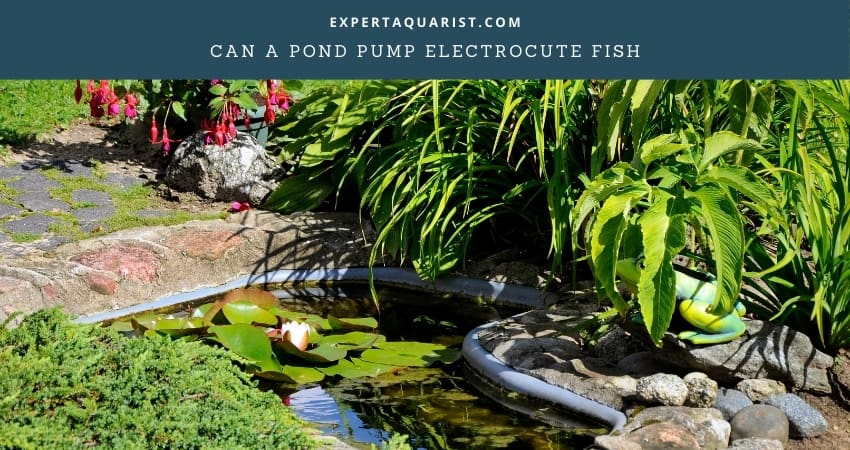You have a beautiful backyard with a pond full of fish that you have worked very hard to keep healthy by installing pond pumps, putting up fences, feeding them regularly, and whatnot. What if one day you wake up, go to the pond to feed them and suddenly you see the worst, all your fish are either dead or injured.
This could be a reality if you don’t manage your pump well. Because a pond pump may electrocute fish, severely harming and even killing them. Though a pond pump can be used to clean up debris in your pond, aerate the water and provide a more natural habitat for fish, it is important to know the risks.
So, let’s discuss further the topic to help our little buddies to live safely and securely.
Why fish might get electrocuted
A pond pump can most certainly electrocute a fish. The actual topic of discussion is why fish get electrocuted.
Let’s take a look at the reason that fish may get electrocuted and the science behind it.
One of the first things we learn in science class is that water is an excellent conductor of electricity. This means that electricity flows through the water better than most other objects. So, if there is an electrical appliance near water, there is a high chance that anything touching that water will get electric shocks of varying degrees.
This is where the pond pumps come in. We all know that most pond pumps are submersible. But it runs a high risk of electrocuting anything that lives or comes in contact with that water, no matter how well insulated the pump maybe.

What causes the electrocution in a pond
There can be various reasons for which a pond pump can electrocute fish. Although the probability is quite low, it does happen from time to time.
1. Having unprotected outlets
One of the primary reasons for this is when the pump outlets are not GFCI grounded. This will allow the electricity to flow in large amounts so much so that your pump can not handle it and it will leak. So, the fish have a chance of getting electrocuted. Many older homes are at risk of this because almost none of them have GFCI outlets.
Similarly, if the pump isn’t connected to an RCD outlet, any excess flow of electricity will go to the pump unrestricted and will electrify the pond water, potentially electrocuting the fish
2. Sabotaged wiring
All submersible pond pumps contain rubber seals that insulate the pump. But occasional failures of these seals may occur. Even the tiniest malfunction can spell disaster for your fish as any chance of the pump being insulated goes out of the window the moment the seal fails.
Although the companies producing pond pumps take great care while attaching and preparing the wires by coating them with epoxy or neoprene, both of them can be damaged if they are subjected to impact, which can happen while transporting or installing the pump and cleaning the pond. In this case, water will get into the wires and electricity will flow through the whole pond, electrocuting the fish in the process.
3. Damaged pumps
If you live in areas where the water freezes during winter, your fish are at risk of getting electrocuted when they are introduced after the ice melts. Because freezing water turned ice can heavily damage the pumps by freezing the cables which can crack open because of the slightest movement. Once the cable is cracked, water will run into it and electrify the pond.
In case the pump is placed near heavy and abrasive objects like rock, metal, or any other sharp objects, they will almost certainly come in contact with the pump, damaging it and risking the lives of the fish in the pond.
All electrical devices have their shelf lives. If your pond pump is too old, it’s more likely to malfunction for various reasons. The seals may break, the epoxy may waste away, the cables may be nearing the end of their lives. Any one of these reasons may end up being the reason for the electrocution of your pond’s fish.
How to prevent electrocution of fish
You can follow a number of ways to prevent your pond pump from electrocuting the fish in your pond. Some of them are discussed below.
Firstly, make, sure that your pump is connected with an RCD outlet or grounded by a GFCI outlet. By doing this you are making sure of preventing excess electricity from flowing into your pump. The advantage of doing this is when a GFCI or an RCD outlet detects excess electricity flow, it automatically shuts the pump down.
Make sure that the rubber seals are in prime condition. If you detect even the slightest anomaly, remove the pump from the pond as soon as possible.
Make sure the cables are not damaged due to impact. While transporting the pump, ensure that they are packed properly and drive safely to your home. Also, take care when you are installing the pump. While cleaning the pond, do not use sharp or abrasive objects near the pump cables.
While we are on the subject of sharp and abrasive objects, when installing the pump, remove all pieces of metal and rocks from near the cables.
If your pump is old, although you can have an electrician repair it, it is not suggested to do so. Replace an old pump with a new one.
If you need to take the pump out of the pond for any reason, e.g.: Maintenance, don’t just whack it out of the water by the cable. Before taking the pump out, switch the power supply off and unplug it. After taking it out, put it in a water bucket to stop the seals from drying and cracking open.
Once you face this problem, you should investigate the reason the fish have been electrocuted and make sure that doesn’t happen again. They don’t say prevention is better than cure for nothing.
How to check the fish for symptoms
Now that we know what causes the fish to be electrocuted, we have to check for the symptoms of electrocution. There are two reasons for this. First, we have to make sure that the reason they are electrocuted doesn’t occur again. Second, in case it does happen again, we would know what to do and act faster to keep the fish alive and out of harm.
One of two things happens when a fish is electrocuted. They either die or get severely injured. We can examine both kinds of fish to determine whether the fish was electrocuted and then find the remedy for this.
A dead fish
First, let’s assume you found your fish dead in the water. First, you have to make sure if it died from electrocution or any other reason. A fish dying from electrocution will have some distinct signs. Its body won’t be as limp as fish that died of natural causes. It will have broken bones or vertebrae.
It may also have some sort of severe muscle convulsion or compression, making the dead body rigid. If dissected, you will see that their innards have become reddish and blood will have been present.
An Injured Fish
If you find your fish injured, check for the signs of electrocution. One of them is a curved back. If your fish suddenly has a crooked back, it has probably been electrocuted.
Another sign that your fish has been electrocuted is that it will show signs of paralysis. The excess flow of electricity messes with brain signals, causing the nerves to malfunction, which causes this paralysis.
One other sign of electrocution is the burning of skin or scales. If you see burn marks on the skin and scales of your fish, it will indicate its coming in direct contact with an electrical appliance, in this case, the pond pump.
But not all electrocution is caused by a faulty pond pump. Sometimes, lightning also electrocutes the fish. You can not do anything about this if it happens, no matter how rare this may be.
Alternatives
It’s not that you only have to use submersible pond pumps in your ponds. There are plenty of other options you can try out instead of that.
- You can use external pond pumps. They don’t need to be placed underwater, removing all causes of malfunctioning due to water conditions. Even if something does happen, the electricity will not reach the water, making it almost completely safe.
- If you do insist on using submersible pumps, use pumps with low volts.
- Another way you can create water movement and produce enough oxygen for your fish is by installing an air pump. It will supply water underwater, with air bubbles moving the water around, producing large volumes of dissolved oxygen.
Parting Words
Building a pond and taking care of the fish in it requires time, money and effort. It sucks to see all that go to waste because of a small mistake.
Electrocution will likely kill small fish but larger ones may survive an electric shock. If you notice signs of electrocution such as abnormal behavior, lethargy or paralysis then you would need to remove them from the water immediately and call a local vet.






